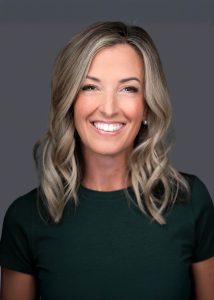By Adam Stone

National Grid helps ensure gas and electricity reach 20 million homes and businesses in New York and Massachusetts. As chief corporate affairs officer, Courtney Geduldig, J.D. ’00, helps ensure that National Grid itself is seen and understood.
Geduldig focuses on reputation and risk management at the company, which is based in the United Kingdom and is one of the world’s largest publicly listed utilities. “The government affairs and public affairs and policy teams report to me,” she says. Also under her umbrella are aspects of communications, stakeholder management, community engagement, and social impact.
“It’s everything that encompasses our external-facing presence as an organization,” she says.
For legal professionals working in “corporate affairs,” the definition of the role has evolved in recent years. Corporations used to view many of these public-facing functions as cost centers, an expense that went toward risk mitigation. Now that’s changing.
Today, corporate affairs work increasingly is seen as “proactive reputation management, external-facing capabilities that could actually add value to a company,” Geduldig says. “It’s become very clear that how an organization shows up in the external environment can have a bottom-line impact.”
In today’s world, “the brand matters,” she says, and as a corporate affairs professional, “you can quantify that: How you engage from an inclusivity standpoint and a social impact standpoint. That can drive investors, can drive talent.”
Hence Geduldig’s wide-range portfolio: Communications and social impact. “Who are we? Why do we do what we do? Putting all of those functions together reflects the integrated nature of all those things,” she says.
This is high-profile work, in that it drives outward-facing impacts. Geduldig works behind the scenes to craft that public perception. “In corporate affairs, we make sure that the people who are front-facing have all the tools they need, that they’re operating in the environment that’s most favorable, to get the outcome that we want,” she says.
Her early career work helped prep her for the role. She was a deputy assistant secretary at the U.S. Department of the Treasury and served as chief financial counsel to U.S. Sen. Bob Corker (R-TN). “As a senior government official, I was often the person behind the person, making sure that a cabinet secretary or a senator could be successful,” she says.
Her present work is much the same. “We’re spending our days talking to governors, members of Congress, members of the administration, to condition the environment for the business and the company to be successful,” she says.
Those who know Geduldig say she’s well-suited for such a role.
“She’s exceptional at building great teams,” says Darlene Bright, J.D. ’02, who is global head of government affairs and public policy at S&P Global and was a co-worker of Geduldig’s. “She has a knack for finding talent, and for challenging members of her team to stretch beyond their traditional skill sets. She is extremely dedicated and loyal, and she is constantly keeping up with new innovations.”
That’s not to say that this is easy. Public-facing work comes with high stakes. “Getting it wrong can go very badly,” Geduldig says. On the upside, she adds, “Getting it right can have a huge impact.”
The biggest challenge often comes in relation to others within her own organization, who may only see the glamour side of the job. “Everybody thinks it’s fun. They want to go talk to members of Congress, they want to spend time with ambassadors and senior officials,” she says. “But there really is an art to it, a sequencing of events — and language is really important, precise wording for things.”
She works hard to help her colleagues understand “that what we are doing is actually trying to protect them, to set them up for success,” she says. And outside her daily work, she helps others to convey that message, as chair the of executive committee of the Public Affairs Council, the nation’s leading professional organization for the public affairs community. “I enjoy giving that back, helping the profession shift, helping my peers to address best practices and do their jobs better.”
While the current high-level pivot from sustainability back to fossil fuels complicates the picture, Geduldig says the bigger issue for her company right now is just in meeting the ever-growing demand for reliable energy. “We do have climate targets we have to meet, but our primary reason for existing is to provide that energy to our customers when they need it, how they need it, and at an affordable rate,” she says.
But Geduldig has navigated change before. “I was with S&P right after the financial crisis,” she says. If anything, she finds these market upsets “an interesting challenge.”
Her UBalt Law experience grounded her in the skills that she needs to meet that challenge. “UBalt Law teaches you the critical thinking skills,” she says. “It’s about asking that next question. It’s not the first question you ask, it’s the next two and three: Planning out what would happen next.”
In law school, that comes through in the way students evaluate case law and learn to solve problems. “Those skills from law school are invaluable,” she says. “And at UBalt Law in particular, you’re being taught by actual professionals. The emphasis on internships and actual working experience makes a real difference.”
Adam Stone is a writer based in Annapolis.
